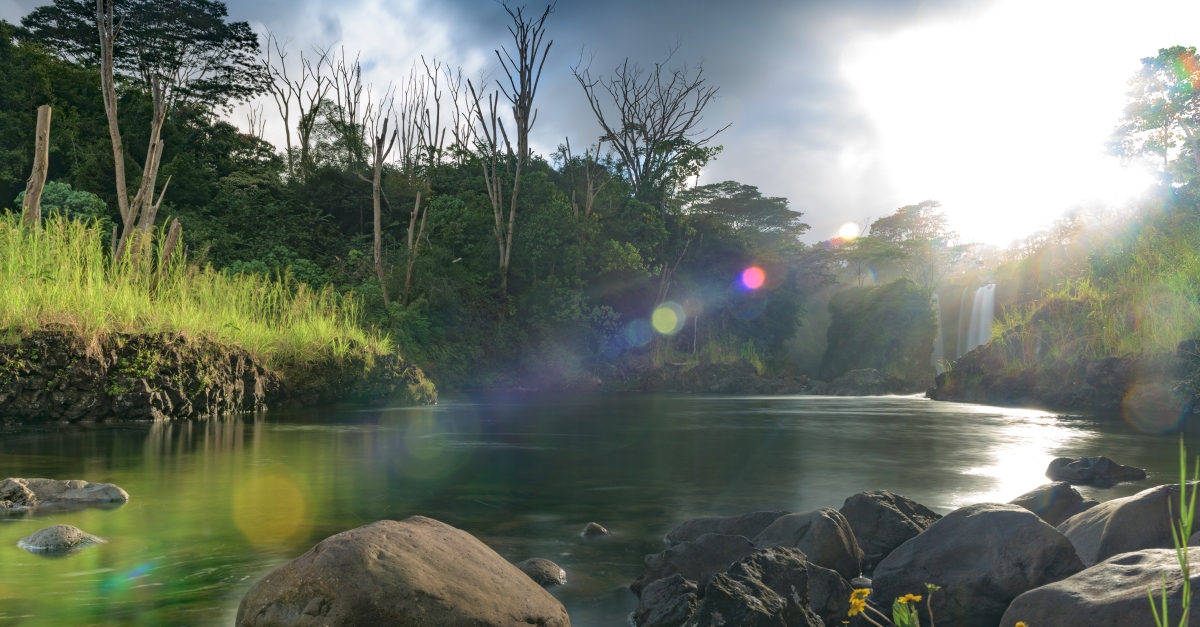Our planet earth is stunning in its beauty, complexity, and ability to provide for us. You are, right this moment, perched on a rotating planet that is suspended in outer space! The earth both spins and moves around the sun, in a rotation that takes about 365 days, called a revolution.
Think of it! Earth, the third planet from the sun, is only the fifth largest planet in the solar system, but it is the only one in our solar system with water on the surface.
God created this beautiful planet specifically for us, His beloved creatures. He wanted to give us a home that would provide for us, please us, and teach us more about Him. Our job is to protect and care for what He gave us. God is very clear about His earth and how He wants it cared for.
Let’s take a look! Here are a few ways God calls upon each of us to protect our earth:
God Tells Us How He Made Earth
We know the earth is very important because the Bible, God’s Holy Word, begins by telling us how He created it. The Bible does not mince words nor covers extraneous topics, so the fact that there is so much about our planet in the Bible indicates its importance to Him.
“In the beginning God created the heavens and the earth,” explains Genesis 1:1-2. “Now the earth was formless and empty, darkness was over the surface of the deep, and the Spirit of God was hovering over the waters.” This is the Lord’s template, and He then moved, as Genesis illustrates, to create the waters, the land between the waters, day and night, and our beautiful sky. His perfect, unerring artistry was at work in the deep vacuum of space. Incredible!
Genesis 1:29-30 tells us how He supplied everything that man would need to live: “Then God said, ‘I give you every seed-bearing plant on the face of the whole earth and every tree that has fruit with seed in it. They will be yours for food. And to all the beasts of the earth and all the birds in the sky and all the creatures that move along the ground—everything that has the breath of life in it—I give every green plant for food.’ And it was so.”
John 1:3 succinctly explains the origins of the planet: “Through him all things were made; without him nothing was made that has been made,” while Genesis 1:31 explains that what He had made pleased Him: "God saw all that he had made, and it was very good. And there was evening, and there was morning—the sixth day.”
In short: if God created it for us, we should care for it, seriously and gratefully, with a consistent awareness of the gift we have received.
God Gave Man Dominion Over Earth
Genesis 1:26-30 explains how God handed over the earth to man, and what He wanted man to do with it. These verses read, in part, “Then God said, ‘Let us make mankind in our image, in our likeness, so that they may rule over the fish in the sea and the birds in the sky, over the livestock and all the wild animals, and over all the creatures that move along the ground.’”
God also commands, “fill the earth and subdue it” (Gen 1:28). He says, “Rule over the fish in the sea and the birds in the sky and over every living creature that moves on the ground.”
The words “subdue” and “rule” in these passages give humanity a task — God is handing earth to man, to treat responsibly. You don’t notice the Lord saying, Go and do what you wish with this magnificent creation; I’m hands-off from here on out! No, He is specific in what He wants man to do — become stewards of His creation, using it productively and caring for it responsibly.
God lovingly provided everything we would ever need from a home planet: “Everything that lives and moves about will be food for you. Just as I gave you the green plants, I now give you everything” (Gen 9:3).
Our loving God never leaves us lacking; it is our job to take our role as stewards seriously and gratefully.

Photo Credit: ©GettyImages/Eachat
God Uses Our Earth to Teach Us Important Lessons
God uses our rich, resource-filled planet to teach us many important things about how we are to live. Deuteronomy 22:6 reveals, “If you come across a bird’s nest beside the road, either in a tree or on the ground, and the mother is sitting on the young or on the eggs, do not take the mother with the young.” God is saying this to both foster a climate of caring for lower beasts in our relationship with our planet, and to show a tender mercy for mothers.
Job 12:7-10 reminds, “But ask the animals, and they will teach you, or the birds in the sky, and they will tell you; or speak to the earth, and it will teach you, or let the fish in the sea inform you. Which of all these does not know that the hand of the Lord has done this? In his hand is the life of every creature and the breath of all mankind.” Here, the Bible is telling us, beautifully, to learn from the creatures of our world, and to respect them, too, because the Lord is intimately involved in every creature’s life cycle.
Deuteronomy 25:4 teaches us to care for the animals that serve us, and by extension, all those who work for us and help us in life. “Do muzzle an ox while it is treading out the grain” is a way for God to teach us to be kind to our working animals; our “beasts of burden.”
The Bible uses birds to beautifully explain God’s tender watchfulness over mankind: “Look at the birds of the air; they do not sow or reap or store away in barns, and yet your heavenly Father feeds them. Are you not much more valuable than they?” (Matthew 6:26) What a stunning reminder that we are precious, loved, and provided for, using birds as an example.
God’s Wrath Is Expressed Through His Creation
The Book of Revelations points to a time when mankind will wreak havoc on the earth — and to God harshly dealing with those who do so: “The nations were angry, and your wrath has come. The time has come for judging the dead, and for rewarding your servants the prophets and your people who revere your name, both great and small—and for destroying those who destroy the earth.”
Jeremiah 45:4 warns the people of the Old Testament about God’s wrath, which will be expressed through the land they count on for sustenance: “But the Lord has told me to say to you, ‘This is what the Lord says: I will overthrow what I have built and uproot what I have planted, throughout the earth.’”
He warned man, again through the prophet Jeremiah, about neglecting the earth: “I brought you into a fertile land to eat its fruit and rich produce. But you came and defiled my land and made my inheritance detestable” (Jer 2:7).
The Bible shows us that it angers God to see the earth abused and neglected, and that He can use it as a tool to express His wrath.
Any responsible Christian will take whatever steps he or she can to protect the earth — our gift from the Lord — created with His artistry and power. Responsible stewardship for our planet is not a political consideration, but a moral, ethical and spiritual responsibility to protect the planet we’ve been given — and the only one we have!
Photo Credit: ©Unsplash/Ben White
 Deirdre Reilly is a writer and editor, and her commentary has appeared on various websites including CBN.com, FoxNews.com, and others. Her new book, “The Pretend Christian: Traveling Beyond Denomination to the True Jesus,” details her own personal journey through doubt and fear into true belief. You can connect with Deirdre via www.deirdrereilly.com, or follow her on Twitter at @deirdrewrites.
Deirdre Reilly is a writer and editor, and her commentary has appeared on various websites including CBN.com, FoxNews.com, and others. Her new book, “The Pretend Christian: Traveling Beyond Denomination to the True Jesus,” details her own personal journey through doubt and fear into true belief. You can connect with Deirdre via www.deirdrereilly.com, or follow her on Twitter at @deirdrewrites.